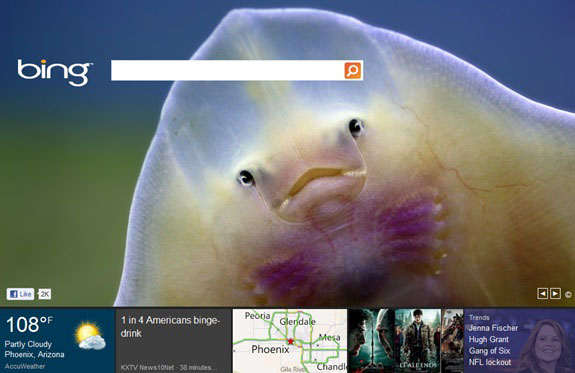Here’s an amazing Stupid Search Engine Trick: typing the words “view” and “topic” in one query (or “phpbb”) into Bing will crash it.
Tag Archives | Bing
Bing Goes Metro
 (image courtesy Within Windows)
(image courtesy Within Windows)
Are you getting the impression that Microsoft is pretty proud of its tile-based, “keep-it-simple-stupid” Metro user interface, as seen in Windows Phone 7? You should. After moving both its MSDN developer site and the Microsoft Download Center to the much simpler layout, Microsoft is about to give its Bing search engine a makeover.
The tiles across the bottom of the Bing screen will show various blurbs of information including local weather, sports and traffic, as well as current trending searches. The idea follows what we’ve seen from Windows 8: that these tiles are meant to display blurbs of useful information in a visually appealing way. And it’s also well-suited for touch-screen devices.
6 comments
Is Traditional Search Passé?
 Microsoft Bing chief Stefan Weitz made a pretty significant pronouncement in an interview with The Huffington Post on Wednesday: search as we know it is dead. That’s quite the statement.
Microsoft Bing chief Stefan Weitz made a pretty significant pronouncement in an interview with The Huffington Post on Wednesday: search as we know it is dead. That’s quite the statement.
In simplest terms, the old fashioned way of search results being nothing much more than a list of returned links just isn’t cutting it — a business model that’s made Google a ton of money.
Lets be fair, though: Bing isn’t that much better. In both cases the two search engines have focused their efforts on “the social,” hoping that is the answer. Google’s social search solution is +1, which gives greater weight to returned results that people in a user’s social circle may have liked. Microsoft is doing something similar, but in that case their using content culled from a friend’s Facebook stream.
7 comments
Bing Adds Facebook Social Features

Microsoft’s search site Bing just got a whole lot more social with the addition of a bunch of new Facebooky features so you can “bring the Friend Effect to search” (Bing’s phrase, not mine).
What’s the Friend Effect? According to Bing, it’s the way that “90 per cent of people seek advice from family and friends as part of the decision making process.”
2 comments
Bing + Yahoo = Search Success?
 While at first some of us (myself included) may have looked at Microsoft’s deal last August to power Yahoo searches with skepticism, the move may finally be paying off–and could be eating into Google’s dominance in search.
While at first some of us (myself included) may have looked at Microsoft’s deal last August to power Yahoo searches with skepticism, the move may finally be paying off–and could be eating into Google’s dominance in search.
Hitwise found in March that the two sites combined now account for 30.01% of all searches in the US, up about a point and a half from the previous month. Google on the other hand dropped, moving from 66.69% to 64.42%, indicating that the people who weren’t using it were likely headed to Bing.
What’s behind this change? It could be that Microsoft’s algorithms are doing a better job at finding what searchers want. Experian Hitwise — who provided this data — found that on Yahoo and Bing, about 81 percent of all searches resulted in a visit to a website. Compare this to Google, which is significantly lower at 65 percent of all queries.
Could it really be that Bing just has a better handle on search? Sounds like Internet blasphemy (Google even accused Microsoft of stealing its search results) but that really could be the case. Microsoft has been hard at work behind the scenes making changes, and it’s clear it’s serious about becoming a player.
I’m still a Google guy, but hey technology changes fast, and that might not always be the case. Go ahead Bing, impress me…
4 comments
A Better Response From Bing
Search Engine Land’s Danny Sullivan has a great post providing the clearest version to date of Bing’s side of the great Bing-Google kerfuffle. Bing still denies copying Google results–but it sounds like it all depends on the definition of “copy,” and that Bing does incorporate data from searches done on all sorts of sites, not just Google. In my first post on this I said that Bing’s behavior sounded iffy. But the weird thing is, the more that comes out, the harder it is to figure out what I think about this.
Before the whole thing dies down, I hope that Google responds at least once more time, with (A) a reaction to Bing’s explanation as provided in Danny’s story; and (B) some disclosure about whether it uses Chrome and/or the Google Toolbar to do anything even sort of similar to what Microsoft does with IE and Bing Toolbar data.
2 comments
Google vs. Bing: The Squabble Continues
 I’ve been watching the odd debate between Google and Bing executives over Bing’s alleged copying of Google search results wih an uneasy fascination. There’s an interesting question here about legitimate and illegitimate uses of clickstream monitoring to shape search results. But both sides have adopted pissy, confrontational tones that haven’t done much to clarify matters. (All Things Digital’s Kara Swisher thinks the whole affair may be a preview of the Larry Page era at Google.)
I’ve been watching the odd debate between Google and Bing executives over Bing’s alleged copying of Google search results wih an uneasy fascination. There’s an interesting question here about legitimate and illegitimate uses of clickstream monitoring to shape search results. But both sides have adopted pissy, confrontational tones that haven’t done much to clarify matters. (All Things Digital’s Kara Swisher thinks the whole affair may be a preview of the Larry Page era at Google.)
But Google engineer Matt Cutts has a new post up which I like: His points seem reasonable and he engages in no sniping or whining. I agree with him that Bing honcho Yusef Mehdi’s “We do not copy results from any of our competitors. Period. Full stop.” is, at best, confusing given that (A) Bing does seem to have replicated the nonsense results that Google planted as part of its sting operation; and (B) Bing representatives also seems to have defended watching IE users’ clicks on Google and mixing results based on their actions there into the gumbo of Bing’s algorithm.
At the moment, I think that Google has the edge in this tussle, mostly because it’s explained its stance more coherently and (somewhat) more politely. (Of course, reasonable people may disagree.)
If Microsoft’s stance is that it hasn’t been copying Google results (period, full stop), the best thing it could do would be to explain why that isn’t the case–in language as measured and dignified as Cutts’s. Tell us, Bingfolk: Why haven’t your actions amounted to cloning links from a competitor’s search results?
11 comments
Google Says Bing is Cribbing Its Search Results
 I’m attending Farsight today in San Francisco. It’s an interesting conference on search, sponsored by Microsoft’s Bing but featuring participants from Google, Blekko, Wolfram Alpha, and other companies involved in the never-ending quest to make it easy to find stuff on the Web.
I’m attending Farsight today in San Francisco. It’s an interesting conference on search, sponsored by Microsoft’s Bing but featuring participants from Google, Blekko, Wolfram Alpha, and other companies involved in the never-ending quest to make it easy to find stuff on the Web.
Oddly enough, the big news at the event doesn’t involve big news at the event–it concerns Google’s charge that Bing relays information about IE users’ Google searches back to Microsoft, which uses it to influence the results on Bing. Google confirmed the practice by running a sting operation involving “synthetic” search results for unusual searches, and says that Bing is “cheating.” Bing doesn’t deny anything, but says it’s not copying and that what it’s doing has only a minor effect on its results.
Search guru Danny Sullivan of Search Engine Land, who understands the implications of all this way better than I do, has an exhaustive story and promises more stuff to come. He comes to the conclusion that what Bing is doing is legal, and covered by IE’s terms of service, but that “Bing should develop its own search voice without using Google’s as a tuning fork.” Seems like a reasonable conclusion to me. And I have a hunch that Microsoft will come out of this concluding that it needs to stop doing this, for PR reasons if nothing else…
No comments
Ask.com Lives!
 In my new Technologizer column for TIME.com, I write about Google alternatives, including Bing and Blekko. I also say I’m sorry there aren’t more of them: Among both big longtime Google rivals and startups, there seems to be a widespread assumption that Google has the search-engine market locked up and investing in core search-engine technology is therefore pointless.
In my new Technologizer column for TIME.com, I write about Google alternatives, including Bing and Blekko. I also say I’m sorry there aren’t more of them: Among both big longtime Google rivals and startups, there seems to be a widespread assumption that Google has the search-engine market locked up and investing in core search-engine technology is therefore pointless.
One of those big longtime Google rivals is Ask.com, which announced last week that it’s going to cease work on its own search engine, use one provided by an unnamed third party, and focus on its Q&A service. Yesterday, I met up with Ask CEO Doug Leeds here at the Web 2.0 Summit conference in San Francisco, and we talked a bit about the company’s change in focus.
Leeds, first of all, said that he was sorry that it didn’t make sense for Ask to continue to build its own search engine from scratch. He pointed out, accurately, that Ask had a history of doing inventive stuff that later showed up in in its larger competitors. (Parts of this 2007 Ask redesign look like a blueprint for Google and Bing in 2010.) He said that made it tough for a smaller site such as Ask to compete based on pure innovation, and factored into the company’s decision to outsource search.
No comments
Bing Gets Facebook-ized
 I’m at an event at Microsoft’s Silicon Valley campus, where a bunch of Microsoft and Facebook executives (including Facebook founder Mark Zuckerberg) just finished showing some new Bing features that should start rolling out shortly. The two companies (which first established a partnership four years ago) are working together to integrate stuff Facebook knows about you and your friends into Bing search results, using Facebook’s Instant Personalization feature.
I’m at an event at Microsoft’s Silicon Valley campus, where a bunch of Microsoft and Facebook executives (including Facebook founder Mark Zuckerberg) just finished showing some new Bing features that should start rolling out shortly. The two companies (which first established a partnership four years ago) are working together to integrate stuff Facebook knows about you and your friends into Bing search results, using Facebook’s Instant Personalization feature.
Mostly, what Bing is doing is looking at which Facebook Like buttons your buddies have clicked around the Web, then inserting a module into search results that spotlights pages they’ve given a thumbs-up. We saw examples involving searches relating to cars, San Francisco steakhouses, and the movie Waiting for Superman.
When you search for a person, Bing will also use your Facebook friendships to try and return relevant results–the example we saw involved a search for “Brian Lee” that returned a module with Brian Lees who were friends of the user’s friends.
